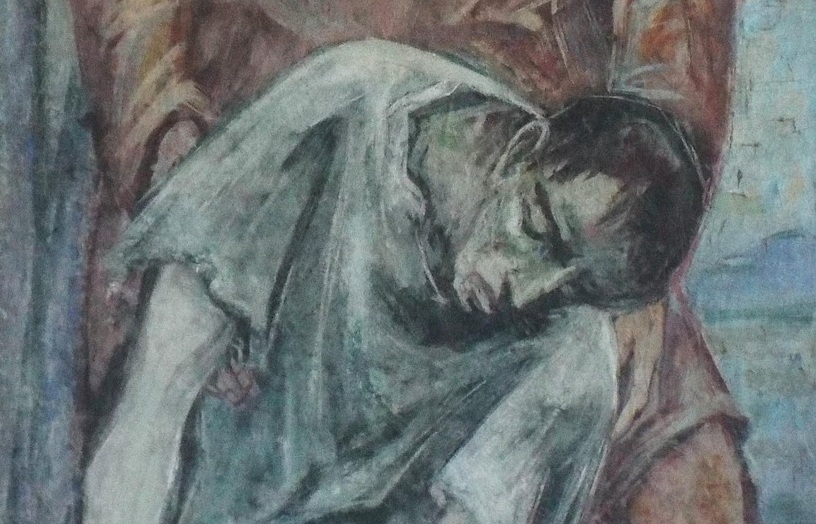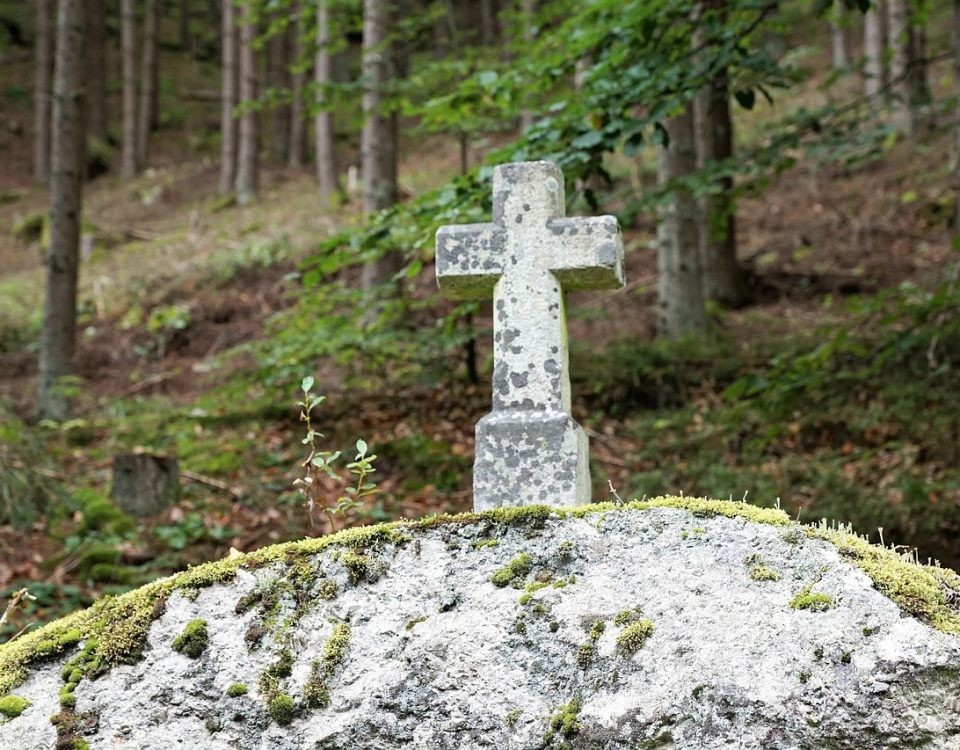Once long ago there was a woman named Sabina.
She was a witness to injustice—a murder, a martyrdom. The weird thing was, though, is that it made her laugh. She giggled at the scene, at the words between the judge and the condemned. She couldn’t stifle herself; she couldn’t hide the smirk on her face.
People started to look at her; maybe she was losing it. Finally, the bailiff—I’m sure not quite knowing what to make of her—walked up to her and asked, “You laugh?” To which she answered simply, but no less strangely, “If God wills I do. “You see, we are Christians. Those who believe in Christ will laugh unhesitatingly in everlasting joy.” To be fair, the condemned—a priest named Pionius—was cracking jokes himself. The judge had just threatened to burn him alive, but all Pionius said to that was, “It is far worse to burn after death.” That’s what made Sabina giggle; Pionius, by the way, would make jokes until his last breath.
And to the judges and executioners and onlookers it was all just derangement. These strange believers were threatened with very rational, very sober, very real violence; but it didn’t seem to work. “You are going to suffer something you do not like,” the bailiff said to Sabina. “Women who refuse to sacrifice are put into a brothel.” That’s a very sober threat; but it didn’t work. Still, I imagine, with a face all a grin, the woman nonplussed, she said to the threat simply this: “The God who is all holy will take care of this.” Which we can only assume he did; we don’t know how she died. Perhaps she was killed just like Pionius; we don’t know. She called herself the priest’s “sister.”[1] That’s how they’d got into this mess together in the first place, belonging together in a family of believers. I imagine she shared his end.
It’s weird behavior, odd behavior. And I’ve wondered about it a long time. The tradition is full of such strange behavior; the martyrs especially—some of them—were downright funny. Not clowns, they were more like smart alecks, obnoxious comedians of their own deaths. Think George Carlin, but Christian. Laughing at the world, laughing at the devil, laughing at the flesh: these Christians were different. They marched to a different drummer. They didn’t love what others loved or fear what others feared. So much unlike us, I think they were better Christians, genuine. And I’ve always wondered what they would say about us, about our comforts and compromises, about how we dare still call ourselves followers of Jesus. What does Easter mean? What did it mean for them? What does it mean for us? Sometimes I doubt it means the same thing.
But that’s probably because we see all this as merely the practice of religion and not the beginning of a whole new life. Darkness invaded by light; the everlasting word of God in warlike conflict with the false wisdom of the world; death and resurrection in water: this is no mere ceremony; it’s an enlistment. Whether you fail to see that is your problem; how the saints and angels and God see it is what finally matters. You’ve dared to call yourself a Christian tonight; you’ve dared to call yourself a Catholic. Be careful and take heed to know what that means. Because you’ll be tested on it later; really, believe it or not.
But what does this new life look like? David Bentley Hart, that darling interpreter of Eastern Orthodoxy, wrote once (and I like it) that “Easter should make rebels of us all.”[2] That’s true. I also like what Wendell Berry said about it, when he wrote: “Practice resurrection.” “[E]veryday do something that won’t compute,” he wrote. “Ask the questions that have no answers…As soon as the generals and the politicos can predict the motions of your mind, lose it.”[3] But again, what on earth does that look like? For us, such perfectly curated consumers so completely conditioned by our screens, what does it look like to practice resurrection? How can this holy night be something other than mere religion? How can it mark the beginning of an entirely new life? What does Easter look like in this Good Friday world?
I don’t know. Maybe it’s surprising. Maybe it’s not what you’d expect, something out of bounds. Maybe it’s something upsetting, even. Maybe it’s Ukrainian soldiers on Snake Island telling a Russian warship what it can do with itself. Maybe it’s a man standing in front of tank in Tiananmen Square. Maybe it’s a nun kneeling before the military junta in Myanmar. Maybe it’s Black children in Birmingham, Alabama sixty years ago marching against Bull Connor’s dogs and firehoses; the power of the water tore skin, lifted children over cars. When Robert Kennedy criticized King for allowing children to march, all he said in return was that Black children “are hurt every day. The minute they’re born until the day they die, they’re hurt in a much more damaging way…it’s the moral of the thing to see them ready to march…” As King had told his fellow marchers all along, “if they try to kill you, develop a willingness to die.”[4] What if that’s what it looks like to practice resurrection? Still up for it? It makes sense, you know, why so many of us keep our religion merely religion; because we know this is the real thing, and it frightens us.
But maybe it’s not always as intense as that. We’re not all going to be martyrs. Maybe for us at first it simply looks like our being willing to be different, our being willing to be visibly Christian (that may cause you trouble enough). Maybe it looks like not fitting in. Maybe it looks like the pro-lifer at the Women’s March or the guy with the Black Lives Matter shirt at the March for Life. Maybe it looks like the person who loves and prays for both Joe Biden and Donald Trump, yet wise about both. Maybe it looks like the person who welcomes the unborn and the mother, the poor families in our city and the immigrant families risking it all for hope. Maybe it’s the person who loves the poor and the rich. Maybe it’s the person who cherishes the Church’s teaching on sexuality, understands and accepts it, cherishing the beauty of love, but who also knows how to love absolutely everyone. Maybe it’s the person who refuses to get swept up in our screened, Orwellian, dystopian hatred of the people they tell us to hate. Maybe it looks like Christians refusing to play the political punks of any political party, left or right. Maybe it looks those who cherish the virtues, all of them. Maybe it looks like us finally living the Christian life as if it matters, not just sentimentally (that’s cheap), but wholly, ethically, genuinely—enough to make you strange but beautiful, like angels and saints. Whom, of course, you now can be like, because of the grace that’s come upon you.
It just depends on whether you’ll actually be a Christian—that is, a “good” one, as Saint Augustine used to say. “You are called the faithful; live faithfully,” he said.[5] That’s the challenge—to live faithfully. No one can make you; no one will force you. But you will answer for what you dare say to God tonight. You are being enlisted; I hope you’ve thought about it. For none of this is magic; it is simply grace. The door is opened to you, but there will be many obstacles.[6] May you learn how to laugh as the saints do, strange though it is. And may we learn to laugh together, strange though we are. For the world could use a good laugh. Amen.
[1] The Martyrdom of Pionius the Presbyter and his Companions 7, 18
[2] David Bentley Hart, The Doors of the Sea, 81
[3] Wendell Berry, “Manifesto: The Mad Farmer Liberation Front”
[4] Jonathan Rieder, Gospel of Freedom, 116-117, 3
[5] Augustine, Sermon 260D 2
[6] 1 Corinthians 16:9
© 2022 Rev. Joshua J. Whitfield










